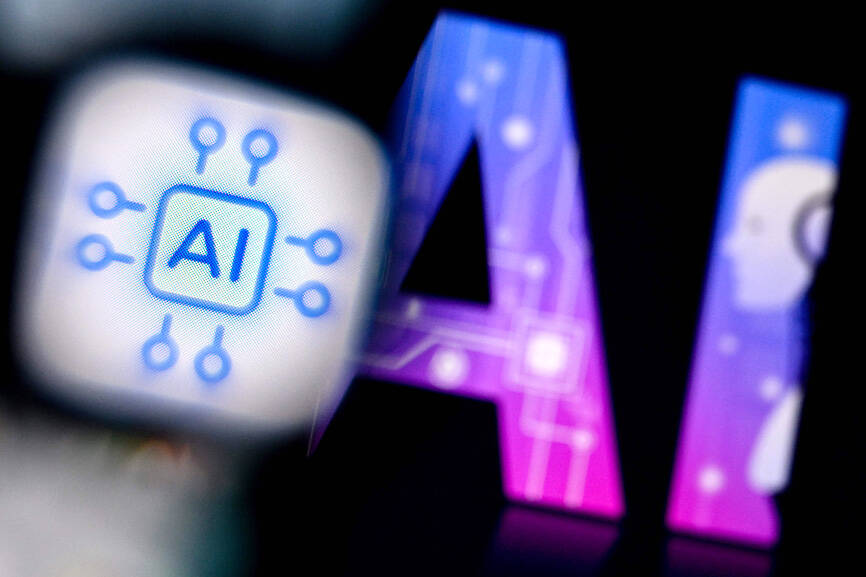Conversational artificial intelligence (AI) tools might soon “covertly influence” users’ decision making in a new commercial frontier called the “intention economy,” University of Cambridge researchers warned in a paper published yesterday.
The research argues the potentially “lucrative yet troubling” marketplace emerging for “digital signals of intent” could, in the near future, influence everything from buying movie tickets to voting for political candidates. Our increasing familiarity with chatbots, digital tutors and other so-called “anthropomorphic” AI agents is helping enable this new array of “persuasive technologies,” it added.
It would see AI combine knowledge of our online habits with a growing ability to know the user and anticipate his or her desires and build “new levels of trust and understanding,” the paper’s two coauthors wrote.

Photo: AFP
Left unchecked, that could allow for “social manipulation on an industrial scale,” the pair, from Cambridge’s Leverhulme Centre for the Future of Intelligence, argued in the paper published in the Harvard Data Science Review.
It characterizes how this emergent sector — dubbed the “intention economy” — would profile users’ attention and communicative styles and connect them to patterns of behavior and choices they make.
“AI tools are already being developed to elicit, infer, collect, record, understand, forecast, and ultimately manipulate and commodify human plans and purposes,” coauthor Yaqub Chaudhary said.
The new AI would rely on so-called “large language models” to target a user’s cadence, politics, vocabulary, age, gender, online history, and even preferences for flattery and ingratiation, the research said.
That would be linked with other emerging AI tech that bids to achieve a given aim, such as selling a cinema trip, or steering conversations toward particular platforms, advertisers, businesses and even political organizations.
“Unless regulated, the intention economy will treat your motivations as the new currency,” coauthor Jonnie Penn said.
“It will be a gold rush for those who target, steer, and sell human intentions,” he added. “We should start to consider the likely impact such a marketplace would have on human aspirations, including free and fair elections, a free press, and fair market competition, before we become victims of its unintended consequences.”
Penn noted that public awareness of the issue is “the key to ensuring we don’t go down the wrong path.”

GROWING OWINGS: While Luxembourg and China swapped the top three spots, the US continued to be the largest exposure for Taiwan for the 41st consecutive quarter The US remained the largest debtor nation to Taiwan’s banking sector for the 41st consecutive quarter at the end of September, after local banks’ exposure to the US market rose more than 2 percent from three months earlier, the central bank said. Exposure to the US increased to US$198.896 billion, up US$4.026 billion, or 2.07 percent, from US$194.87 billion in the previous quarter, data released by the central bank showed on Friday. Of the increase, about US$1.4 billion came from banks’ investments in securitized products and interbank loans in the US, while another US$2.6 billion stemmed from trust assets, including mutual funds,

Micron Memory Taiwan Co (台灣美光), a subsidiary of US memorychip maker Micron Technology Inc, has been granted a NT$4.7 billion (US$149.5 million) subsidy under the Ministry of Economic Affairs A+ Corporate Innovation and R&D Enhancement program, the ministry said yesterday. The US memorychip maker’s program aims to back the development of high-performance and high-bandwidth memory chips with a total budget of NT$11.75 billion, the ministry said. Aside from the government funding, Micron is to inject the remaining investment of NT$7.06 billion as the company applied to participate the government’s Global Innovation Partnership Program to deepen technology cooperation, a ministry official told the

Taiwan Semiconductor Manufacturing Co (TSMC, 台積電), the world’s leading advanced chipmaker, officially began volume production of its 2-nanometer chips in the fourth quarter of this year, according to a recent update on the company’s Web site. The low-key announcement confirms that TSMC, the go-to chipmaker for artificial intelligence (AI) hardware providers Nvidia Corp and iPhone maker Apple Inc, met its original roadmap for the next-generation technology. Production is currently centered at Fab 22 in Kaohsiung, utilizing the company’s first-generation nanosheet transistor technology. The new architecture achieves “full-node strides in performance and power consumption,” TSMC said. The company described the 2nm process as

JOINT EFFORTS: MediaTek would partner with Denso to develop custom chips to support the car-part specialist company’s driver-assist systems in an expanding market MediaTek Inc (聯發科), the world’s largest mobile phone chip designer, yesterday said it is working closely with Japan’s Denso Corp to build a custom automotive system-on-chip (SoC) solution tailored for advanced driver-assistance systems and cockpit systems, adding another customer to its new application-specific IC (ASIC) business. This effort merges Denso’s automotive-grade safety expertise and deep vehicle integration with MediaTek’s technologies cultivated through the development of Media- Tek’s Dimensity AX, leveraging efficient, high-performance SoCs and artificial intelligence (AI) capabilities to offer a scalable, production-ready platform for next-generation driver assistance, the company said in a statement yesterday. “Through this collaboration, we are bringing two